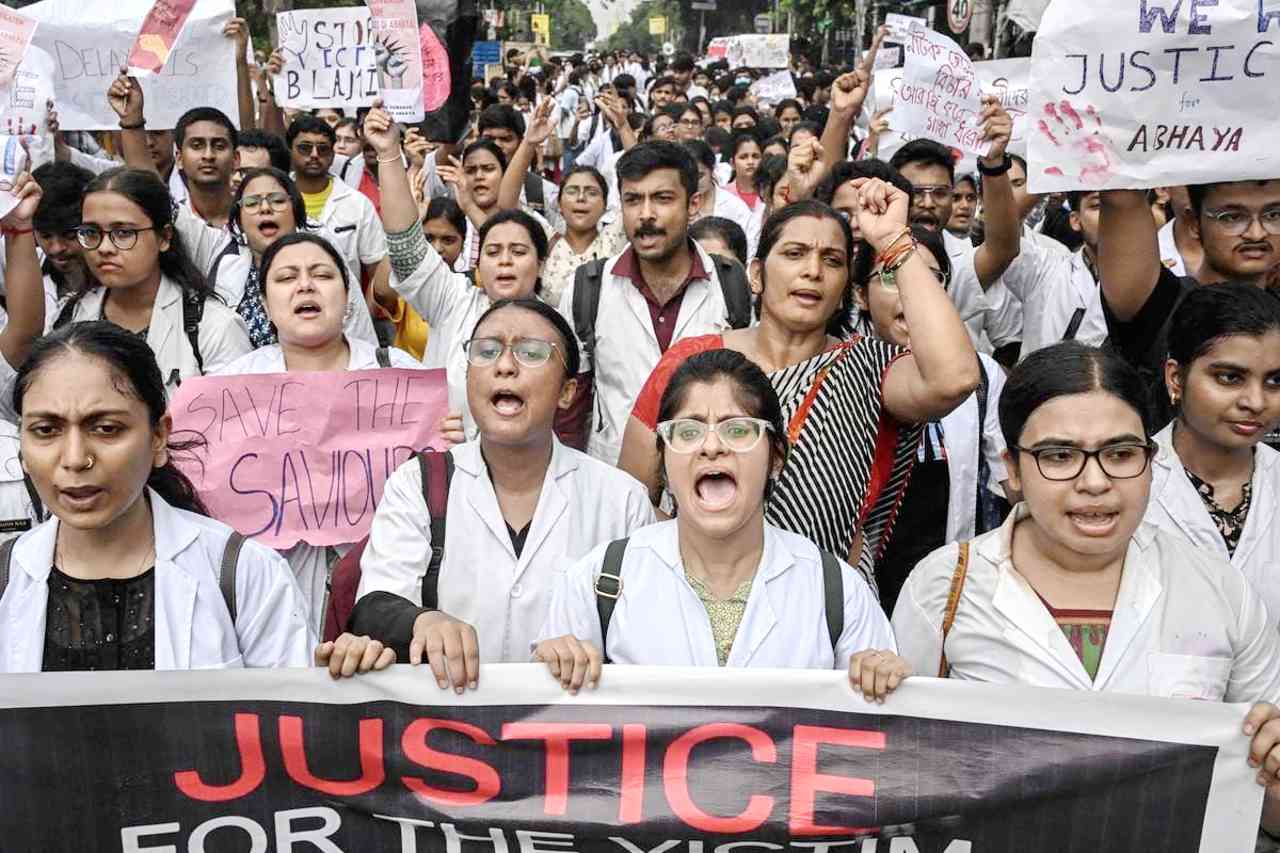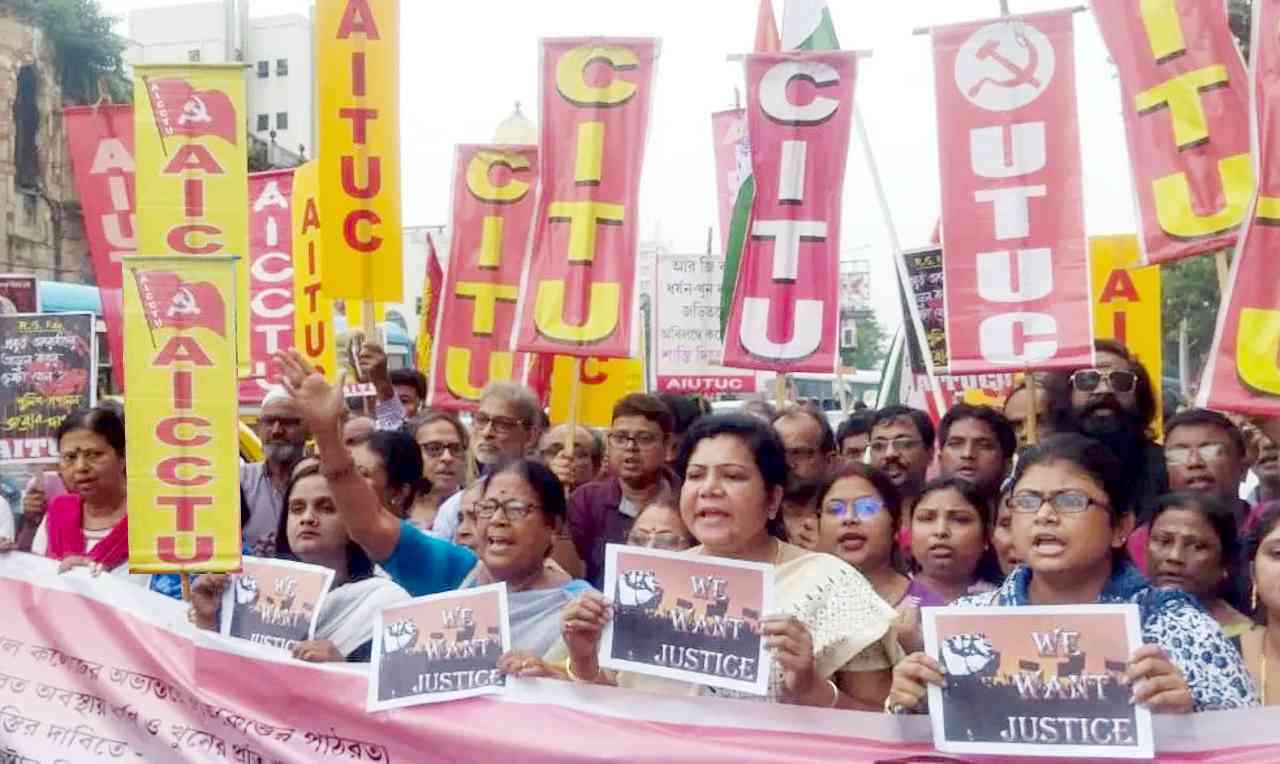We Want Justice: The Renewed Struggle for Safety and Freedom for Women in India

The horrific rape and murder of a 31-year-old postgraduate trainee doctor in Kolkata's RG Kar Medical College and Hospital has triggered a massive people's assertion in West Bengal powered by a remarkable women’s initiative called 'Reclaim the Night' – derived from an international movement - on the eve of Independence Day. This August 15, the focus was turned on the crucial question of women's freedom, women's safety and women's inalienable right to a dignified and democratic life in today's India. The fact that a young doctor was killed and brutalised in her own hospital after completing a strenuous 36-hour-shift became a shocking symbol of the utter lack of safety of women in their workplaces. The idea of small protests planned in select spots of Kolkata soon grew into an unprecedented statewide assertion by women. Students, doctors and concerned citizens across the country too were quick to come out on the streets in solidarity with the West Bengal movement.
In some ways, India is reliving moments of the 2012 anti-rape upsurge which had followed the Nirbhaya case - the rape and murder of a 22-year-old physiotherapy intern in a private bus. Back then it had led to not just countrywide powerful protests but also the setting up of a judicial committee, holding of extensive consultations with women's organisations and activists and major updatings of the criminal law to make it more effective in dealing with sexual harassment and violence. The six men involved in the crime had all been arrested: one died in custody, four have been executed by hanging on 20 March 2020, and the juvenile offender has served his sentence.
The anti-rape movement in 2012-13 had rightly focused on the question of justice in cases of sexual harassment and violence and making it easier to file cases, quickening the process of investigation and increasing the rate of conviction of the perpetrators. This time too the central chant that rent the air across West Bengal and beyond was ‘we want justice’. It was to ensure that justice was done that the people of West Bengal came out on the streets promptly and strongly to foil every perceived attempt to cover up the heinous act and shield anybody guilty or complicit in this ghastly crime. The ’Reclaim the Night’ call emerged precisely against the crude victim-blaming statement by the principal of the RG Kar Medical College (RGKMC). When the same principal was entrusted with the charge of another medical college in the city just hours after he was forced to resign from the post of principal of RGKMC, the anger of the people understandably spread like wild fire.
The inaction of the police in the face of vandalism in the RG Kar Medical College and Hospital - on the very night when tens of thousands of people were out on Kolkata streets in the 'Reclaim the Night' assemblies and marches - only added to the anger and resolve of the people. As did the farcical exercise in which Chief Minister Mamata Banerjee staged a 'protest march' demanding the hanging of the lone accused arrested so far in the case, rather than acknowledging her own responsibility not just as Chief Minister but also being in charge of both health and law and order ministries of the state government.
In another remarkable show of solidarity and protest, the state government's move to cancel a football match between traditional rival clubs Mohun Bagan and East Bengal provoked a united march of football lovers of the top three football clubs of the city - Mohun Bagan, East Bengal and Mohammedan Sporting. Theatre workers, lawyers, and people cutting across all professions and walks of life are continuing with their daily protests demanding justice.
At the recommendation of the Kolkata High Court the investigation has meanwhile been handed over to the CBI. The Supreme Court too has taken suo moto cognizance of the case, asking both the State government and the CBI to submit updates. While appealing to the doctors to end their strike and resume duties, the Supreme Court has announced its decision to form a national task force to decide on measures to strengthen workplace security for medical professionals and health workers. It has also asked the West Bengal government to respect the people's right to organise peaceful protests and not try and violate it by applying force. The pressure mounted by the powerful protest movement has clearly put not just the state government on the defensive but also forced the Supreme Court to respond in a proactive manner. This pressure must have to be kept up to secure some real justice and positive change.
The issue here is clearly not limited to the security of just medical professionals but the right of all women to safety and dignity in workplaces and public spaces as well as in the domestic sphere of homes and families. The very night women were occupying the streets across West Bengal to reclaim their rights, a young Adivasi woman, Priyanka Hansda, was brutally killed in Shaktigarh of Bardhaman district. Around the same time as the horrific RG Kar incident, brutal cases of sexual violence have been reported from several states in India including the rape and murder of a nurse in Uttarakhand, rape and murder of a 14-year-old Dalit girl in Bihar's Muzaffarpur district, and shocking sexual assault on girl students in a renowned school in Badlapur near Mumbai. And just the day before the Supreme Court heard the RG Kar case, the Kerala government released the report submitted by a committee headed by Justice K Hema on pervasive sexual harassment and deeply entrenched misogyny in the Malayalam film industry.
Indeed, there have been any number of horrific rape and murder cases since the 2012 Nirbhaya case - from Kathua in Jammu to Hathras in UP to the shocking incidents in Manipur - that have never really got due attention from the apex court in the country. The Vishaka guidelines instituted by the Supreme Court in 1997 to prevent sexual harassment in workplaces and the updated 2013 Act are still observed more by way of violation. Convicted rapists and rape-accused politicians are routinely rewarded and appeased by the BJP, and as was highlighted by Mamata Banerjee's farcical 'protest' in the RG Kar case, the question of justice is sought to be replaced by most parties by frenzied calls for capital punishment.
The fact that, in spite of the Nirbhaya case where as many as four convicts were executed by hanging, rape still remains such a pervasive crime in India clearly tells us that capital punishment is no deterrent. Institutional measures to ensure a safe environment for women in all spheres, prompt and assured delivery of justice and a strong social awakening and mobilisation against rape culture and patriarchy are the crying needs of the hour. Let the 'we want justice' roar triggered by the RG Kar horror take India firmly forward in this direction.

Charu Bhawan, U-90, Shakarpur, Delhi 110092
Phone: +91-11-42785864 | +91 9717274961 E-mail: info@cpiml.org

